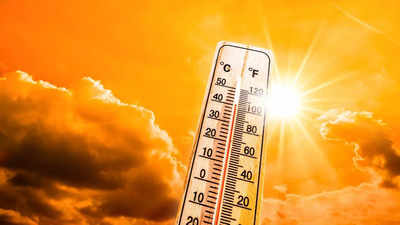NEW DELHI: India is about to expertise an unusually scorching summer season from April to June, with heatwave days anticipated to double in a number of states, the India Meteorological Division (IMD) warned on Monday. Central and japanese India, together with the northwestern plains, are more likely to see extended spells of utmost warmth.
IMD chief Mrutyunjay Mohapatra acknowledged that the majority components of the nation will witness above-normal most temperatures, apart from some areas in western and japanese India, the place temperatures might stay close to regular. Minimal temperatures, nonetheless, are predicted to be above common in most areas.
“From April to June, north, east, and central India, in addition to the plains of northwest India, are anticipated to see two to 4 further heatwave days than normal,” Mohapatra informed PTI. Usually, India data 4 to seven heatwave days on this interval.
States most affected
The states anticipated to witness extra intense heatwaves embody Rajasthan, Gujarat, Haryana, Punjab, Madhya Pradesh, Maharashtra, Uttar Pradesh, Bihar, Jharkhand, West Bengal, Odisha, Chhattisgarh, Telangana, Andhra Pradesh, and the northern components of Karnataka and Tamil Nadu.
Some states, comparable to japanese Uttar Pradesh, Jharkhand, Chhattisgarh, and Odisha, may see as many as 10 to 11 heatwave days, Mohapatra added.
Rising temperatures and well being dangers
In April, most temperatures are forecasted to be increased than normal throughout most of India, whereas some excessive southern and northwestern areas may even see near-normal temperatures. Minimal temperatures will stay elevated throughout a lot of the nation, apart from a number of areas within the northwest and northeast.
The central authorities has already urged states to make sure hospitals are outfitted to deal with heatstroke instances. Final yr, India witnessed a record-breaking summer season with 536 heatwave days—the best in 14 years—resulting in 41,789 suspected heatstroke instances and 143 confirmed deaths.
Nonetheless, specialists warn that heat-related deaths might be underreported resulting from insufficient knowledge assortment.
Electrical energy demand surge anticipated
With rising temperatures, electrical energy demand is predicted to develop by 9-10% this summer season. Final yr, peak electrical energy demand crossed 250 gigawatts on Might 30, exceeding projections by 6.3%. The IMD cautioned that local weather change-driven warmth stress is a major issue behind rising vitality consumption.
The IMD predicts regular rainfall in April, ranging between 88-112% of the long-term common of 39.2 mm. Some areas in northwest, northeast, west-central, and peninsular India may obtain regular to above-normal rainfall. Nonetheless, Mohapatra additionally warned of doable landslides within the Western Ghats area of Kerala and Karnataka, in addition to potential flooding in northeastern states in April.
As India gears up for a hotter-than-usual summer season, authorities are urging preparedness to mitigate the consequences of utmost warmth on public well being and infrastructure.
var _mfq = window._mfq || [];
_mfq.push([“setVariable”, “toi_titan”, window.location.href]);
!(function(f, b, e, v, n, t, s) {
function loadFBEvents(isFBCampaignActive) {
if (!isFBCampaignActive) {
return;
}
(function(f, b, e, v, n, t, s) {
if (f.fbq) return;
n = f.fbq = function() {
n.callMethod ? n.callMethod(…arguments) : n.queue.push(arguments);
};
if (!f._fbq) f._fbq = n;
n.push = n;
n.loaded = !0;
n.version = ‘2.0’;
n.queue = [];
t = b.createElement(e);
t.async = !0;
t.defer = !0;
t.src = v;
s = b.getElementsByTagName(e)[0];
s.parentNode.insertBefore(t, s);
})(f, b, e, ‘https://connect.facebook.net/en_US/fbevents.js’, n, t, s);
fbq(‘init’, ‘593671331875494’);
fbq(‘track’, ‘PageView’);
};
function loadGtagEvents(isGoogleCampaignActive) {
if (!isGoogleCampaignActive) {
return;
}
var id = document.getElementById(‘toi-plus-google-campaign’);
if (id) {
return;
}
(function(f, b, e, v, n, t, s) {
t = b.createElement(e);
t.async = !0;
t.defer = !0;
t.src = v;
t.id = ‘toi-plus-google-campaign’;
s = b.getElementsByTagName(e)[0];
s.parentNode.insertBefore(t, s);
})(f, b, e, ‘https://www.googletagmanager.com/gtag/js?id=AW-877820074’, n, t, s);
};
function loadSurvicateJs(allowedSurvicateSections = []){
const section = window.location.pathname.split(‘/’)[1]
const isHomePageAllowed = window.location.pathname === ‘/’ && allowedSurvicateSections.includes(‘homepage’)
if(allowedSurvicateSections.includes(section) || isHomePageAllowed){
(function(w) {
function setAttributes() {
var prime_user_status = window.isPrime ? ‘paid’ : ‘free’ ;
w._sva.setVisitorTraits({
toi_user_subscription_status : prime_user_status
});
}
if (w._sva && w._sva.setVisitorTraits) {
setAttributes();
} else {
w.addEventListener(“SurvicateReady”, setAttributes);
}
var s = document.createElement(‘script’);
s.src=”https://survey.survicate.com/workspaces/0be6ae9845d14a7c8ff08a7a00bd9b21/web_surveys.js”;
s.async = true;
var e = document.getElementsByTagName(‘script’)[0];
e.parentNode.insertBefore(s, e);
})(window);
}
}
window.TimesApps = window.TimesApps || {};
var TimesApps = window.TimesApps;
TimesApps.toiPlusEvents = function(config) {
var isConfigAvailable = “toiplus_site_settings” in f && “isFBCampaignActive” in f.toiplus_site_settings && “isGoogleCampaignActive” in f.toiplus_site_settings;
var isPrimeUser = window.isPrime;
var isPrimeUserLayout = window.isPrimeUserLayout;
if (isConfigAvailable && !isPrimeUser) {
loadGtagEvents(f.toiplus_site_settings.isGoogleCampaignActive);
loadFBEvents(f.toiplus_site_settings.isFBCampaignActive);
loadSurvicateJs(f.toiplus_site_settings.allowedSurvicateSections);
} else {
var JarvisUrl=”https://jarvis.indiatimes.com/v1/feeds/toi_plus/site_settings/643526e21443833f0c454615?db_env=published”;
window.getFromClient(JarvisUrl, function(config){
if (config) {
const allowedSectionSuricate = (isPrimeUserLayout) ? config?.allowedSurvicatePrimeSections : config?.allowedSurvicateSections
loadGtagEvents(config?.isGoogleCampaignActive);
loadFBEvents(config?.isFBCampaignActive);
loadSurvicateJs(allowedSectionSuricate);
}
})
}
};
})(
window,
document,
‘script’,
);

